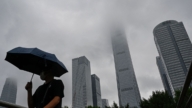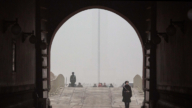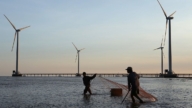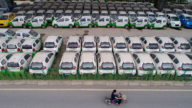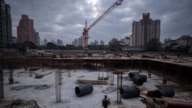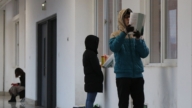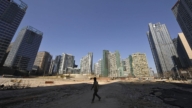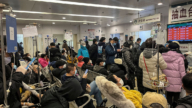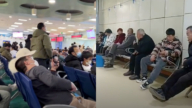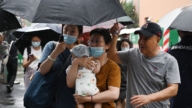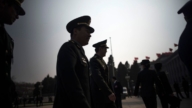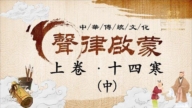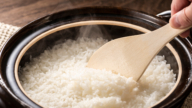【新唐人2014年07月03日訊】近年來,國外不少經濟專家一直在唱衰中國經濟,中共在反駁中國經濟硬著陸的同時,靠大量印製鈔票,投資拉動等方式營造經濟繁榮假象。不過日前中共喉舌媒體終於承認,中國經濟已經患上「結構性絕症」。專家指出,中共決策層遇上了60多年來最難時期。
中共央行在4月末下調農村的商業銀行、和合作銀行的存款準備金率之後,6月中旬又正式下調了部分商業銀行的存款準備金率。短短50天內,央行兩度降低了貨幣準備金。
日前,中共喉舌《人民日報》以「砸錢治不了中國經濟內科病」為題,談及中國資源錯配嚴重,靠發行貨幣,降低貨幣準備金的方法,會導致再度吹大房地產、金融等領域的泡沫,使產能過剩行業繼續膨脹,阻礙未來經濟結構調整和轉型的步伐等。
文章承認了中國宏觀數據不盡樂觀,特別是今年前5個月,經濟持續減速,似乎具備了降低準備金的條件。但是文章援引專家的話說,「降準」並非靈丹妙藥,貨幣政策解決不了當前經濟存在的結構性問題。
中國金融智庫研究員鞏勝利:「放也麻煩,收也麻煩,貨幣發行多了,那就是通貨膨脹,如果收了的話,那可能再出現錢荒,是中國60多年以來最艱難的選擇。」
降低準備金率要起到應有的效果,必須至少具備3個條件,一是﹕整個經濟體系缺貨幣﹔二是﹕整個經濟體系的貨幣流通順暢﹔三是﹕金融體系的利率傳遞機制良好。
目前中國貨幣發行量已經超過110多萬億元人民幣,正在朝著120萬億邁進,超過中國國內生產總值(GDP)將近兩倍。按照GDP的增長率來看,中國的貨幣投放是美國的4倍。而美國的國民生產總值超過15萬億,中國只有8萬億。
中國經濟評論家「牛刀」指出,中共的過度投資把錢變成了死錢,扼殺了貨幣流動的天然屬性,而房地產的嚴重過剩,等於把錢變成鋼筋水泥凝固起來了。
北京大學光華管理學院博士生導師王建國:「中國目前,因為經濟不活躍、不流通,相互交換的經濟交換活動很呆滯。中國現在已經印了很多很多的票子,如果再把票子往裡面加,它一旦經濟回暖,它就會出現經濟泡沫,就會出現金融危機。」
中國經濟學泰斗吳敬璉在某個論壇上說﹕「我擔心的不是房價降不下去,是擔心崩盤。」他還曝光「樓市即將崩盤的10大城市」。吳敬璉指出,現在中國面臨相當嚴重的經濟問題和社會問題。靠投資拉動和耗費大量資源來實現增長的發展模式,造成資源的浪費和環境的破壞,已經到了不能容忍的程度。而大量投資造成的貨幣超發,形成了巨大的通貨膨脹壓力。
中共黨媒引述財經評論人士喬瑞慶的分析指出,目前降低準備金,只能導致貨幣進一步增加,沖抵美國QE(量化寬鬆政策)緊縮效應,維持房地產等資產泡沫,而實體經濟並不能從「降準」中獲取好處。
那麼中國的經濟問題到底出在哪裏呢?
鞏勝利:「現在有幾個方面,一個是現在中國經濟的產業是最低端的,沒有高端,第二個方面,中國經濟的管制太多,比如房地產、鋼鐵產業都不是市場經濟了,中國貨幣完全是中國官方控制的,沒有按照市場經濟的規則來運行。」
吳敬璉指出,中國問題最核心的矛盾還是體制問題。他提出的「體制性障礙」,就是政府有太多配置資源的權利,把GDP的增長看成政績的主要標誌,這是問題所在。而產業結構的問題,造成就業怪象,「大學畢業生、有學位的,就業情況很不好」。他說,「體制上的缺陷,就會造成腐敗的蔓延,造成經濟發展模式的轉型轉不過來,而問題積纍得越來越多。」
採訪編輯/劉惠 後製/李勇
Party Spokesman Admits Economy Facing Toughest Time
The Chinese economy has not been highly regarded by
many international economists for years.
Routinely, the Communist regime reply to the economic hard
landing, is to create the illusion of prosperity
by massive printing of money and investment.
However, recently the party mouthpiece has finally admitted
that China’s economy is “structurally terminally ill."
Experts point out the Chinese Communist Party (CCP) is
at its most difficult time in 60 years.
Late April, the Central Bank lowered deposit reserve ratio
of commercial banks and cooperative banks in rural areas.
The deposit reserve ratio was officially cut
in several commercial banks recently.
In just 50 days, Central Bank lowered reserve currency twice.
Recently, People’s Daily article entitled, “Throwing money
at China’s economic medicine can not cure the disease,"
claimed China suffers from a serious mismatch of resources.
The method of issuing currency and reducing the reserve
currency will lead to further bubbles in real estate
and finance, so that industries with excess capacity continue
to expand, hindering future economic restructuring
and transformation.
The article admitted Chinese macro data has not been
optimistic; especially in the first five months, the economic
slow down, signals it is ready to reduce reserve.
But the article quoted experts as saying, reducing reserve
is not a panacea, monetary policy can not solve the economy’s
structural problems.
Gong Shengli, Chinese financial think tank researcher:
“It is troublesome to either reduce it or increase it.
More money printing means inflation.
Less means a risk of money shortage.
It is the most difficult choice in 60 years."
To achieve effectiveness by reducing the reserve ratio,
at least three conditions must be met:
First, lack of money across the economy;
Second: smooth circulation of currency in the entire economy;
Third: good transmission mechanism of the rate.
More than 110 trillion yuan of currency has been issued,
nearly double China’s gross domestic product (GDP).
According to GDP growth, China’s money supply is
four times that of the United States.
The US GDP is more than 15 trillion dollars, whereas China’s
GDP is 8 trillion dollars, about 64 trillion yuan.
Critic of China’s economy, Niu Dao pointed out the CCP’s
excessive investment is killing the currency and its circulation.
The serious surplus of real estate is equivalent to turning
the currency into concrete.
Professor Wang Jianguo, Management School, Peking University:
“Mutual economic exchange is rather sluggish in China
due to the poor circulation.
Further printing of money on top of excessive printed
money will create an economic bubble and financial crisis
when the economy picks up."
Wu Jinglian notable Chinese economist
said on the Chinese Economists 50 Forum:
“I was not worried about the fall
of house prices, but the collapse."
He also revealed “the 10 cities facing property market collapse."
Wu Jinglian pointed out the serious economic and social
problems in China.
Development growth driven by investment and consumption
of resources has wasted resources and damaged
the environment beyond what can be tolerated.
Excessive currency printing caused by large investments
has become a huge inflationary pressure.
People’s Daily also quoted finance commentator
Qiao Reiqing’s analysis, that reducing the reserve can only lead
to a further increase in the currency, to offset the tightening effect of U.S.
quantitative easing, maintaining real estate and other asset bubbles,
but none of these have a good impact on the real economy.
So, what exactly is China’s economic problem?
Gong Shengli: “One of them is that China’s economy is
at the low end, and the second would be the tight control
of China’s economy.
Real estate and the steel industry are not market economy;
the Chinese currency is fully controlled by the authorities.
It lacks the normal rules of the market economy."
Jinglian said the system is the core contradiction in China.
The “institutional barriers" are that the government
has too much control of resources
and GDP is set as the main indicator of performance.
This system has resulted in a bizarre employment situation:
university graduate employment has been very bad.
He said, “Institutional shortcomings will cause the spread
of corruption, hindering the transformation of economic
development, and accumulate more and more problems."
Edit/LiuHui Post-Production/LiYong


